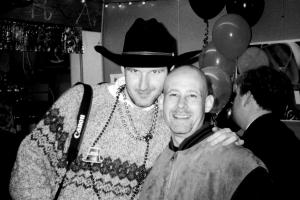
Brain injury and intimacy: A gay perspective
G. Ian Bowles was 37 and living in Little Rock, Arkansas in 2001 when his vehicle hydroplaned during a thunderstorm. He slammed sideways into a bridge support and was in coma for six weeks. When he woke up six weeks later, he says he was first confused about where he was, then unsure if his orientation had changed. Was he still gay or had the brain injury somehow altered him? This is his story of life after brain injury and how he and his partner Tim maintained their relationship.
Brain injuries can be extremely difficult for family relationships, especially with regards to spouses or partners. It is one thing when accidents happen and a sibling or child changes in the emotional or cognitive realm. But when that happens to a spouse, it can be devastating. A relationship once built on experience and memory potentially loses much of its foundation. Commitment and long-term love are suddenly much more important than reciprocated affection and immediate enjoyment.
Such concerns can be even more pronounced if the injured person is gay.
My accident happened in the American South, in Arkansas, where I had moved a year prior. When I woke from my six-week coma, one of the first questions that I was asked was where I thought I was. The last place I remembered was being at school, in Pennsylvania, which turned out to be two years earlier. When they started trying to convince me of my location, I thought it was a joke. When they didn’t give up, I thought it was a conspiracy. I remembered that I had been starting to “come out” before the accident. As a gay man, why would I move to Arkansas, of all places? Then snatches of memory started coming back, including the memories of the gay community in the state and my partner. Slowly it dawned on me that they were telling the truth.
When I was first told about my accident and brain injury, I wondered if there had been any effect on my orientation.
I have degrees in pastoral studies from a conservative bible college; they had always told me that being gay was a “distortion” of what men and women were supposed to be. I thought that perhaps through my brain injury, I might have been “fixed.” Up until this point, all of my nurses and my neuro-psychologists had been women. I remember the first time a male nurse came in to change my IV, and he smiled down at me lying in bed. A very normal interaction. I’m sure he doesn’t remember it. But my question was answered. I knew I was still gay.
There were innumerable little examples of embarrassments that stemmed from my orientation. Filters that I had developed over a lifetime of trying to hide my sexuality were no longer working. I would make comments before I realized that the context or the company were inappropriate. Of course such things happen among many brain injury survivors and those who work with us get used to it. But it did raise a few eyebrows when I seemed to be crossing genders.
Although this is probably more common in Toronto than it was in Arkansas, it is important to remember that it does potentially add an extra layer of emotion to these interactions, depending on how well the person has accepted his or her own orientation. I effectively “came out” twice: once before the accident, and once afterward. Emotionally, the second time was no easier.
My now-husband was determined to work through this with me. One of our difficulties, though, was that there were few support systems for our kind of family. Much though our friends and the gay community in Arkansas were enormously supportive, most of them found it difficult to know exactly what to do to be most effective. Eventually we found (or generated) the necessary links for non-traditional relationships. When pressed at such a personal level, people can be much more open than we expect. Support workers were often very happy to offer us assistance, once they overcame their surprise. In many meetings we were the “token gay couple.”
One of the interesting concerns regarding intimacy is the question of exactly what you remember about experiences with your partner. Such interactions are generally very personal. And very precious. As brain-injury survivors, we get used to being able to half-remember events and picking up cues from those around us so that we can respond correctly. It’s hard to admit that we “don’t remember,” and we can often “fake it.” We become adept at absorbing information about the past from current conversation.
But intimate details are not common knowledge, and are rarely discussed in the same kinds of ways. My husband and I got to where we would review personal details about an evening or a weekend that had been particularly important to us. The intent was, and is, to foster memories. I’m fortunate that I’ve always been a photographer and taken a lot of pictures. These are invaluable with regard to reminding me of events… which then stimulate a generation of memories.




